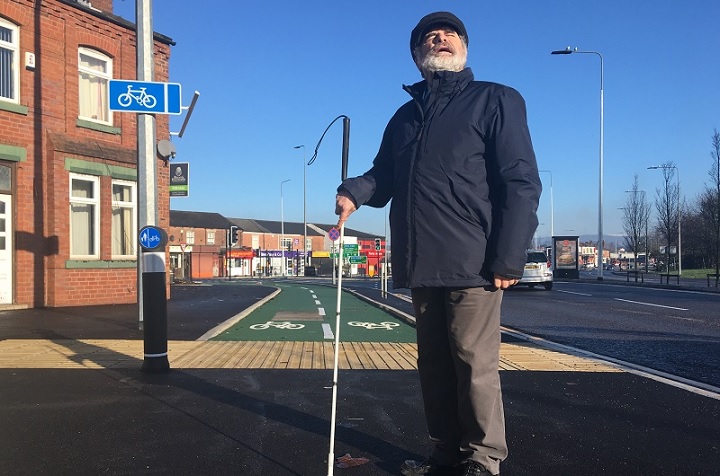
‘Mini-Holland’ cycle lane schemes, which operate in three London boroughs, have created ‘real distress’ for blind and disabled people, a charity has said.
Funded by Transport for London, the ‘Mini-Holland’ schemes have been introduced in Enfield, Kingston and Waltham Forest and incorporate various road design features, including segregated cycle lanes at junctions, to make cycling feel safer and more convenient.
The National Federation of the Blind of the UK (NFBUK) says some Mini-Holland elements – such as the boarder bus stops being used in Enfield – create particular problems for those with a visual impairment.
Boarder bus stops are where the cycle track runs alongside the kerb – and bus passengers get on and off the bus via the track.
Sarah Gayton, NFBUK’s shared space coordinator, says she is ‘shocked’ about the situation in Enfield.
Sarah Gayton said: “The shared space bus stop puts two very vulnerable groups – pedestrians and cyclists – in the same place at the same time.
“Anybody can see the design is flawed and inherently dangerous. The scheme is a disaster for blind people.
“It is difficult to see how this could have been approved as acceptable. It seems to me there has been no real consideration of the needs of blind or frail people.”
Looking at the wider picture, the NFBUK says some councils are ignoring their legal obligations and designing road layouts that make towns less accessible to blind people.
Andrew Hodgson, NFBUK president, said: “We have visited several areas recently where planners have clearly not considered the needs of blind and disabled people.
“The mini-Holland cycle lane schemes funded by TfL have created real distress for blind and disabled people.”
That’s all well and good for Denmark who have had a prolonged culture of pedestrians and cyclists sharing the same surfaces for many decades now. Good for them. However what happens there does not mean that it can happen here as its all new to our culture used to a segregation between road and pavement mentality.
It’s the same mentality everywhere and anywhere where vehicles and pedestrians meet or come into conflict on common ground isn’t it. It’s such a shambles and increasingly dangerous that everyone using that shared space has to look out not only for themselves but for everyone else around. Woonerfs are brilliant ideas but obviously not so for the independent blind and otherwise disabled persons.
Maybe its the case that yes we may expect to see more injuries and deaths as a result of these changes but not to worry, over time people and that includes disabled will have to get used to them and then the deaths and injury rates may come down?
Is that the Danish way? It should not be ours.
R.Craven
+2
“Anyone can see” is hardly an evidenced approach. In contrast :
“Brian Deegan, the cycle infrastructure pioneer who worked for Transport for London until recently, told us that the design of Enfield’s bus stop boarders was the result of hours of research and expert consultation – where safety was the paramount consideration. The Danish design works, he says, because it’s not clear whether the person on the bike or the person on foot has priority. The space must be shared, and people have to negotiate around each other carefully. As a result, the design has an impressive safety record.”
Paul Luton, Teddington
0
It would be very interesting to read what the road safety audits said.
RICHARD WALKER, London
+4